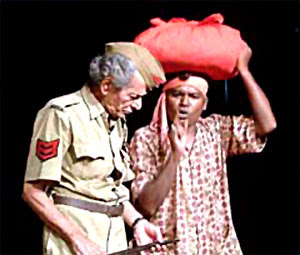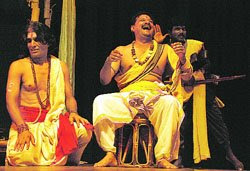72, Lodhi Estate,
New Delhi-110003
Bahroop came into existence in 1996 when a group of people from different walks of life decided to share their experience with a larger section of the society. Its productions Kale Kauwe Ne Kaha, Dekh Tamasha Dekh, Baghichha Bachharam Ka, Zaharqand, Soopna Ka Sapna, Aur Kitne Hiroshima, Yahan Se Shahar Ko Dekho,B-Three, Hamare Waqt Mein, Saaye Hamsaaye, Woh Bhi Thei Apne and Panahgaah were awarded byDelhi Urdu Academy, Government Of NCT of Delhi in 1997, 1999, 2001, 2003, 2004, 2005, 2006, 2007, 2008, 2009, 2010 and 2011 respectively.
Its play Soopna Ka Sapna was staged in 5th Bharat Rang Mahotsav. Bahroop participated in various festivals like Bahoorupi organized by Rangayana, Govt. of Karnataka and Shiv Sanchara National Theatre Festival, Sanehilli, Karnataka. Other successful productions have been Kath Jogi, Madhvi, Toot-Te-Parivesh, Banailey, Reech Gaan, Thank You Mr. Glad, Bada Bhand To Bada Bhand, Nahi Chahiye Hamen..., Kabira Khada Bajar Mein, Men Without Shadows, 1857, Jangal Ke Daawedaar and Cheezein Toot Rahi Hain.Bahroop's Ghair Zaroori Log, 8/6, Yahan Se Shahar Ko Dekho, Spartacus and The Life of Galileo were selected as one of the best plays of Delhi for the year 2001-02, 2003-04, 2004-05, 2005-06, and 2007-08 by Sahitya Kala Parishad,Government Of NCT of Delhi.
Bahroop has also organised talks, seminars and workshops with eminent personalities like Habib Tanvir, J.N. Kaushal, G.P. Deshpande, Satish Anand, D.R.Ankur, Vinit Kumar, Chittaranjan Tripathi, Shrikant Kishore, Piyush Mishra, KS Rajendran, Suman Kumar, HS Shiva Prakash and Mushtaq Kak. It publishes a theatre magazine, Bahroop Theatre Digest.





